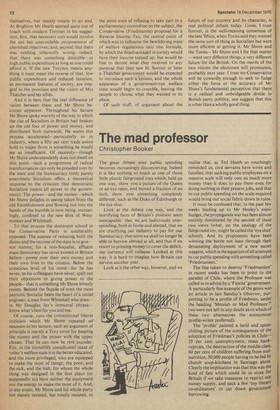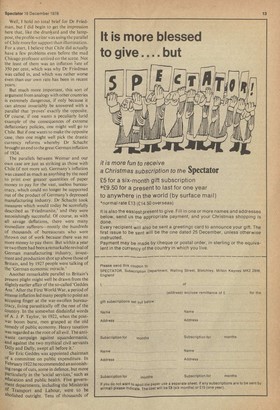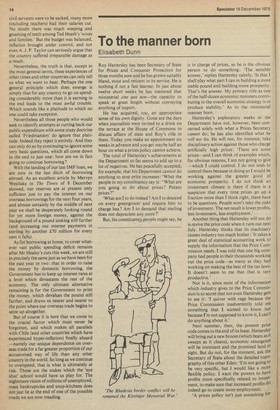The mad professor
Christopher Booker
The great debate over public spending becomes increasingly disconcerting. Indeed it is like nothing so much as one of those little plastic fairground toys which, held up one way, show you a picture of the Queen or an eye open, and moved a fraction of an inch, show you something completely different, such as the Duke of Edinburgh or the eye shut.
Look at the debate one way, and the horrifying facts of Britain's position seem inescapable: that we are ludicrously overspending, both at home and abroad, that we are crucifying our industry to pay for our bureaucracy, that soon we shall no longer be able to borrow abroad at all, and that if we resort to printing money to cover the deficit, our currency will collapse. Looked at this way, it is hard to imagine how Britain can survive another year.
Look at it the other way, however, and we realise that, as Ted Heath so touchingly reminded us, civil servants have wives and families, that sacking public employees on a massive scale will only cost us much more money than it does to pay them even for doing nothing in their present jobs, and that to cut public spending on the scale required would bring our social fabric down in ruins.
It must be confessed that, in the past few weeks leading up to Mr Healey's minibudget, the propaganda war has been almost entirely dominated by the second of these two views (what, on the analogy of the fairground toy, might be called the 'eye shut' school). And its proponents have been winning the battle not least through their devastating deployment of a new secret weapon, which is the equation of all attempts to cut public spending with something called 'Friedmanism.'
The line taken to destroy 'Friedmanism' in recent weeks has been to point to the parallel of Chile, where the Professor was called in to advise by a 'Fascist' government. A particularly fine example of the genre was an article in last Sunday's Observer, purporting to be a profile of Friedman, under the heading 'Messiah or Mad Professor?' (we were not left in any doubt as to which of these two alternatives the anonymous profile-writer preferred).
The 'profile' painted a lurid and spine chilling picture of the consequences of the adoption of Friedman's policies in Chile25 per cent unemployment, mass bankruptcies, the destruction of the middle class, 60 per cent of children suffering from malnutrition, 50,000 people having to be fed bY church soup-kitchens in Santiago alone. Clearly the implication was that this was the kind of fate which could lie in store for Britain if we take measures to restrict our money supply, and sack a few 'toy library co-ordinators' to cut down government borrowing. Well, I hold no total brief for Dr Friedman, but I did begin to get the impression here that, like the drunkard and the lamppost, the profile-writer was using the parallel of Chile more for support than illumination. For a start, I believe that Chile did actually have a few problems even before the mad Chicago professor arrived on the scene. Not the least of them was an inflation ?ate of 350 per cent, which was why Dr Friedman was called in, and which was rather worse even than our own rate has been in recent years.
But much more important, this sort of argument from analogy with other countries is extremely dangerous, if only because it can almost invariably be answered with a parallel that 'proves' exactly the opposite. Of course, if one wants a peculiarly lurid example of the consequences of extreme deflationary policies, one might well go to Chile. But if one wants to make the opposite case, then one might well pick the drastic currency reforms whereby Dr Schacht brought an end to the great German inflation of 1924.
The parallels between Weimar and our own case are just as striking as those with Chile (if not more so). Germany's inflation was caused as much as anything by the need to print ever greater quantities of paper money to pay for the vast, useless bureaucracy, which could no longer be supported out of the product of Germany's depressed manufacturing industry. Dr Schacht took measures which would today be scornfully described as 'Friedmanite,' and they were astonishingly successful. Of course, as with all savage deflations, there were many immediate sufferers--mostly the hundreds of thousands of bureaucrats who were thrown out of work because there was no more money to pay them. But within a year or two there had been a remarkable revival of German manufacturing industry, investment and production shot up above those of Britain, and by 1927 people were talking of the 'German economic miracle.'
Another remarkable parallel to Britain's Present plight might well be drawn from the Slightly earlier affair of the so-called 'Geddes Axe.' After the First World War, a period of Intense inflation led many people to point an accusing finger at the war-swollen bureaucracy, living parasitically off the rest of the Country. In the somewhat disdainful words of A. J. P. Taylor, in 1922, when the postwar boom burst, men grasped at the old remedy of public economy. Heavy taxation was regarded as the root of all evil. The antiwaste campaign against squandermania, and against the two mythical civil servants billy and Daily, swept all before it.'
Sir Eric Geddes was appointed chairman of a committee on public expenditure. In February 1922 he recommended an astonishing range of cuts, some in defence, but more Particularly in the social services,' such as education and public health. Five governMent departments, including the Ministries of Transport and Labour, were to be abolished outright. Tens of thousands of
civil servants were to be sacked, many more (including teachers) had their salaries cut.
No doubt there was much weeping and gnashing of teeth among Ted Heath's 'wives and families.' But the budget was balanced, inflation brought under control, and not even A. J. P. Taylor can seriously argue that the country suffered irreparable damage as a result.
Nevertheless, the truth is that, except in the most general terms, these experiences of other times and other countries can only tell us what we want to hear. Perhaps the one general principle which does emerge is simply that for any country to go on spending considerably more than it is earning in the end leads to the most awful trouble. Which sounds like a platitude to which no one could take exception.
Nevertheless all those people who would seek to identify attempts at cutting back our public expenditure with some crazy doctrine called 'Friedmanism' do ignore that platitude. Indeed they reject it entirely. And they can only do so by continuing to ignore some very basic questions, which all come down in the end to just one: how are we in fact going to continue borrowing?
With the landing of our last IMF loan, we are now in the last ditch of borrowing abroad. As an excellent article by Mervyn Westlake in The Times of 8 December showed, our reserves are at present only sufficient just to pay the interest on our overseas borrowings for the next four years, and almost certainly by the middle of next year we shall be desperately looking round for yet more foreign money, against the background of a pound sinking still further (and increasing our interest payments in sterling by another £.70 million for every cent it falls).
As for borrowing at home, to cover whatever vast public spending deficit remains after Mr Healey's cuts this week, we are still in precisely the same jam as we have been for the past year or two: that in order to raise the money by domestic borrowing, the Government has to keep up interest rates at a level which devastates the rest of the economy. The only ultimate alternative remaining is for the Government to print the money, which devalues the pound still further, and draws us nearer and nearer to the point where our overseas trade begins to seize up altogether.
But of course it is here that we come to the crucial factor which must never be forgotten, and which makes all parallels with Chile (and other countries which have experienced hyper-inflation) finally absurd —namely our unique dependence on overseas trade for a far greater proportion of our accustomed way of life than any other country in the world. So long as we continue to overspend, that is what is ultimately at risk. Those are the stakes which the 'eye shut' school would have us play for. The nightmare vision of millions of unemployed, mass bankruptcies and soup-kitchens does not just lie at the end of one of the possible roads we are now treading.
















































 Previous page
Previous page